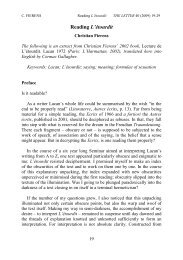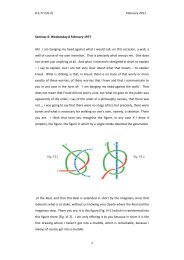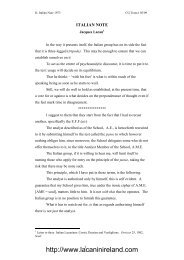Seminar XXIV Final Sessions 1 - Lacan in Ireland
Seminar XXIV Final Sessions 1 - Lacan in Ireland
Seminar XXIV Final Sessions 1 - Lacan in Ireland
Create successful ePaper yourself
Turn your PDF publications into a flip-book with our unique Google optimized e-Paper software.
look of the Real, there is not, for the subject, at B3-R3 any recourse to any cornerwhatsoever, that the recourse summoned by the signifier of the Name of theFather is go<strong>in</strong>g to be to create a little nook, namely, a nook that is go<strong>in</strong>g towithdraw him from the Other, but which is also go<strong>in</strong>g to withdraw him fromhimself by constitut<strong>in</strong>g him as not know<strong>in</strong>g, s<strong>in</strong>ce it is precisely this corner itself,the corner <strong>in</strong> which he has the most of himself, the most symbolic of himself thatis go<strong>in</strong>g to be evaporated. I would say that at that moment – scripture says to us‘let there be light’ – what is at stake at that moment is ‘let there be a hole’, this isan expression of <strong>Lacan</strong>’s. And this is perhaps what happened <strong>in</strong> the syntacticalformula that I evoked earlier. Hav<strong>in</strong>g said this, how is it that the subject – I amturn<strong>in</strong>g all the time around that as you can see – who has lost speech, is go<strong>in</strong>g torediscover it and is go<strong>in</strong>g to be able to say ‘It’s you’? Well then I would say due tothe <strong>in</strong>tervention of the signifier of the Name of the Father, which recreated theprimal repression, which made S 2 disappear and restored the o-object <strong>in</strong> its place,because of the operation of this signifier of the Name of the Father, the subjectreaches a different po<strong>in</strong>t of view, a po<strong>in</strong>t of view where he does not know theequivalence between the knowledge of the Other and the key which is lack<strong>in</strong>g <strong>in</strong>him. He discovers that it is not because the Other recognises that he is lack<strong>in</strong>g,that there is not <strong>in</strong> him the key, that he lacks the essential key of his be<strong>in</strong>g, it isnot because the Other recognises that that he knows it. I would even say thatwhen he discovers that the Other can recognise the existence of this key while notknow<strong>in</strong>g it, namely, not be<strong>in</strong>g able to restore it to him, if, <strong>in</strong> a first moment hemay fall <strong>in</strong>to despair, <strong>in</strong> truth this is go<strong>in</strong>g to re<strong>in</strong>troduce him to hope, because ifthe Other is <strong>in</strong> the position of recognis<strong>in</strong>g what he does not know, that <strong>in</strong>troducesthe dimension of the fact that the Other himself has lost this same key, that heknows well what lack is <strong>in</strong>volved, and the hope that is opened up then, is to makepresent the absence of this lost un<strong>in</strong>scribable th<strong>in</strong>g, and the hope, is precisely thatthe un<strong>in</strong>scribable can cease not to be written. And that is what is delivered atS(Ø).The unlikely paradox on which one ends up, as one might say, is how a signifier,this signifier of S(Ø), can assume this unth<strong>in</strong>kable contradiction of be<strong>in</strong>g at oncewhat ma<strong>in</strong>ta<strong>in</strong>s open the gap of what does not cease to be written – when youread, when you hear music that overwhelms you or a poem that overwhelms you,75














